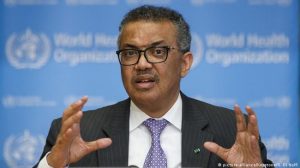The World Health Organisation (WHO) says it has launched the Preparedness and Resilience for Emerging Threats Initiative (PRET), an integrated approach to pandemic planning, by focussing on groups of pathogens.

Dr. Tedros Ghebreyesus, WHO Director-General, said this during an online media conference.
“Today, WHO launched the PRET, which the acronym is deliberate: ‘prêt’, meaning ‘ready’ in French.
“Rather than focusing on specific pathogens or diseases, PRET takes an integrated approach to pandemic planning, by focussing on groups of pathogens and the systems they affect.
“To begin with, PRET will focus on respiratory pathogens, including influenza, coronaviruses, RSV, and as-yet-unknown pathogens,” he said.
Ghebreyesus said that pandemics were, by definition, global events, so PRET was designed to promote collaboration between countries.
According to him, it is also designed to promote collaboration between sectors.
He said that as COVID-19 demonstrated, a pandemic was not just a health crisis, it affected economies, education, trade, travel, food supply systems and more.
WHO boss said that PRET would therefore support countries to engage as many sectors as possible, as well as civil society groups, religious communities and young people.
“This integrated approach will help countries to review, test, and update their pandemic planning efforts to ensure they have the right capacities and capabilities in place,” he said.
Ghebreyesus said that the COVID-19 pandemic was a powerful demonstration of the lifesaving power of vaccines.
He said that the Strategic Preparedness and Response Plan – the (SPRP) outlining the steps countries needed to take to prepare for, and respond to the new virus.
According to him, in first week of May the organisation will publish its fourth SPRP, which is designed to guide countries over the next two years to transition from an emergency response to long-term, sustained management of COVID-19.
“We are very encouraged by the sustained decline in reported deaths from COVID-19, which have dropped 95% since the beginning of this year.
“However, some countries are seeing increases, and over the past four weeks, 14,000 people lost their lives to this disease,” he said.
Ghebreyesus said that an estimated one in 10 infections resulted in post-COVID-19 condition, suggesting that hundreds of millions of people would need longer-term care.
According to him, as the emergence of the new XBB.1.16 variant illustrates, the virus is still changing, and is still capable of causing new waves of disease and death.
“We remain hopeful that sometime this year, we will be able to declare an end to COVID-19 as a public health emergency of international concern.
“But this virus is here to stay, and all countries will need to learn to manage it alongside other infectious diseases.
“The new SPRP will support countries to make that transition,” he said.
According to him, vaccines have played a key role in helping to curb COVID-19, the pandemic severely disrupted routine immunization programmes around the world.
“Over the course of the pandemic, essential immunisation levels fell in more than 100 countries, leading to rising outbreaks of measles, diphtheria, polio and yellow fever.
“Between 2019 and 2021, an estimated 67 million children missed out on at least one essential immunization, including 48 million children who missed out entirely.
“This dramatic reversal follows almost a decade of stalled progress, and has set back vaccination rates to levels not seen since 2008,” he said.
Ghebreyesus said that WHO and partners launched “The Big Catch-up”, a global effort to boost vaccination levels in children to at least pre-pandemic levels.
He said that The Big Catch-up would have a particular focus on 20 countries around the world in which three-quarters of the children who missed out on vaccination in 2021 lived.
WHO boss said that all countries, rich and poor, had work to do in addressing the barriers to immunisation, whether access, availability, cost or disinformation.
Also, on malaria, he said there had been incredible progress made against it over the last two decades.
According to him, advances in nets, tests and medicines have helped to prevent more than 2 billion cases and saved an estimated 12 million lives.
“The world’s first malaria vaccine has so far reached 1.5 million children in Ghana, Kenya and Malawi, and a second malaria vaccine is now in development.
“These innovations have been made possible by investment in cutting edge research and development.
“But even with all of these advances, malaria remains a leading cause of death for people in low-income countries, and still claims more than 600,000 lives each year.
He said that at a time when more investment was needed, the global malaria response faced significant shortfalls.
“World Malaria Day, marked every April 26, is a reminder of the urgent need to close investment gaps, scale up research and development.
“By using all the tools we have, old and new, we can move closer to the vision of “zero malaria,” Ghebreyesus said.
By Franca Ofili
